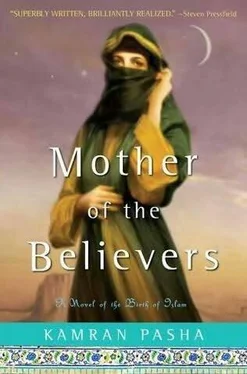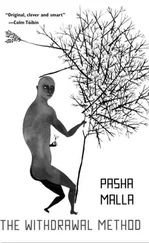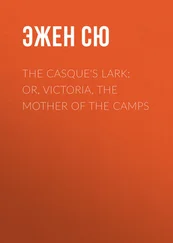Her throaty screams, her sheer insane passion, boiled the blood of the Meccans. Muawiya watched in despair as the crowd fled from his side and surrounded her, spinning and dancing with the frenzy she inspired. Soon, both men and women were chanting along with Hind, mesmerized by her spell.
Muawiya shook his head, awed and frightened by his mother’s ability to capture the minds of the masses. They were like flies caught in a glittering web as she steadily crept up to feed upon their souls. He turned to Abu Sufyan, who had just been handed the keys of Mecca with Abu Jahl’s death and yet looked increasingly old and irrelevant.
“Behold, Father, how a woman steals your throne,” Muawiya said contemptuously. “But fear not, one day I shall regain the honor of the House of Umayya.”
And with that, the brooding young man walked away, his mind racing with thoughts of how to turn the troubling course of events to his advantage.
Even as our enemies plotted against us in Mecca, a new threat was rising on our very doorsteps. The Muslim victory at Badr had changed the political map of the peninsula. The Ummah had been transformed from a small and insignificant community into a force to be reckoned with, not just for Arabs but for Jews.
Yathrib was the ancient home of three Jewish tribes-the Bani Qaynuqa, the Bani Nadir, and the Bani Qurayza. In the beginning, the Jews had cautiously welcomed the Messenger’s arrival as the new arbiter. Muhammad was clearly a man committed to establishing justice and order in the oasis and ending the tribal wars that pitted not only Arabs against Arabs but sometimes Jews against Jews. The Messenger had drafted a treaty of mutual defense whereby the Jewish and Arab tribes would unite against any attacker but both would be free to follow their own religion.
But it was that very matter of religion that had quickly led to strife. My husband claimed to be a prophet in the line of Moses and the Jewish messengers. He had ordered us to pray toward Jerusalem and even fasted on the Jewish Day of Atonement, which they called Yom Kippur and we knew as Ashura. And yet the Jews had made it clear that he could not possibly be a prophet of their God, since they alone were the Chosen People. The Arabs, even though they were descended from Abraham through his first son, Ishmael, were not included in God’s covenant. The Messenger had been shocked and saddened by their rejection. To him, God’s message was for all mankind. How could it be that only one tribe would be privy to His Word? And yet the Jews held steadfast to their ancient beliefs and did not shy away from branding Muhammad as an impostor. And the relations between our communities had quickly chilled.
But not all of the Jews of Medina were hostile to us. A rabbi named Husayn ibn Sallam had come to respect the Messenger as a sincere man seeking to bring the Arabs a better religion than the barbaric idolatry in which they were immersed. Ibn Sallam worked tirelessly to build bridges between the two faiths, to the derision of many among his own clan. His public show of friendship with Muhammad had cost him dearly, and the rabbi had become increasingly isolated from his fellow believers.
And there was another, more private, supporter among the Jewish tribes. A beautiful girl named Safiya, daughter of the Jewish chieftain Huyayy ibn Akhtab of the Bani Nadir. When she had first heard that a prophet had arrived from the south, claiming to bring the Word of God to a wayward people, Safiya had been swept away by the romance of the idea. She had always loved her father’s tales of Moses confronting the Pharaoh and leading God’s people to freedom. Of Elijah standing up to the hubris of Jezebel and her Israelite puppet Ahab. Jeremiah, Isaiah, Ezra-all messengers of the God of Israel who had stood in defiance of power with the humble strength of truth.
Ever since she was a girl, Safiya had fantasized about living in those days, when God spoke to men and the world was renewed by heroes of faith. Growing up as the daughter of a tribal leader and politician, she had watched the difficulties of ordering life in the desert and the troubling choices her beloved father, Huyayy, had to make to keep his people safe in the wilderness. Safiya had longed for God to send another prophet and take away her father’s burdens. To clarify right from wrong with the sword of justice so that the shadows of ambiguity that weighed on men’s souls would vanish under the rays of divine law.
So when word spread through the oasis of a prophet who spoke words of power that changed men’s souls, she had been filled with wonder. Could it be that her prayer had been answered, that she had indeed lived to see the coming of God’s Chosen One, the man whom her people had hoped for since the days the Temple walls fell into oblivion? But she had quickly learned that her people did not share her enthusiasm and that her father in particular viewed the rise of this Arab prophet as a threat to Jewish survival.
Safiya had buried her fascination with Muhammad in her heart. She kept wisely silent when she heard her father mock the man, denigrating the claim of this illiterate Arab to divine inspiration. And yet, over the past two years, this illiterate Arab’s power had only grown, and her father no longer dismissed him as a madman. Muhammad’s movement could not be ignored as a foolish cult anymore. The world was changing around them, and Muhammad’s increasing power had become a source of alarm for the Jewish tribes.
And so it was that Safiya watched one night as three men sat glumly in her house, trying to make sense of a world they no longer recognized. Her father had invited Kab, the chieftain of the Jewish tribe Bani Qurayza, as well as their Arab ally Ibn Ubayy for what had become a weekly meeting to discuss the changing political face of Medina. But the three chieftains had sat around Huyayy’s elegant cedar table for almost an hour without a word, each lost in his own thoughts about the remarkable Muslim victory at Badr and what it meant for the oasis. Safiya served them honey cakes, which remained untouched. Unable to bear the silence any longer, she finally decided to speak up.
“Why do you not rejoice, Father?” she asked casually, but with full knowledge that the subject was no casual matter. “Your allies have won a victory against the idolaters.”
Huyayy gave her a sharp look. “These men of Quraysh I have known for many years,” he responded. “Idolaters they may have been, but they were honest in their trade. I take no pleasure in their deaths.”
The Arab chieftain Ibn Ubayy grasped his wine goblet and took a long sip. He appeared calm, but anger burned inside him.
“Muhammad’s victory has convinced these Muslims that God is truly on their side,” he said with an incredulous tone.
Safiya hesitated. She knew that she was pushing her luck, but she needed to say what was in her heart.
“Perhaps he is,” she said courageously. “Rabbi Ibn Sallam says-”
Huyayy knocked over his wineglass, the purple stain rapidly spreading over the beige table coverlet.
“Don’t quote that old fool to me!” Like many, Huyayy was discomfited by the broad-minded rabbi’s willingness to test the boundaries of Jewish tradition and scripture.
Safiya recoiled as if she had been slapped. She could feel her cheeks grow warm with hurt. Her father had changed so much since Muhammad had arrived in Medina. Normally boisterous and kind, he had become increasingly brooding and prickly. And she blamed the treacherous Ibn Ubayy for poisoning his mind with plots and fears.
As Safiya turned to leave, her head held proudly, she was surprised to feel her father’s strong hand take hold of her wrist.
“Forgive me, my daughter,” he said softly. “The world is changing so rapidly. I feel lost.”
Читать дальше












